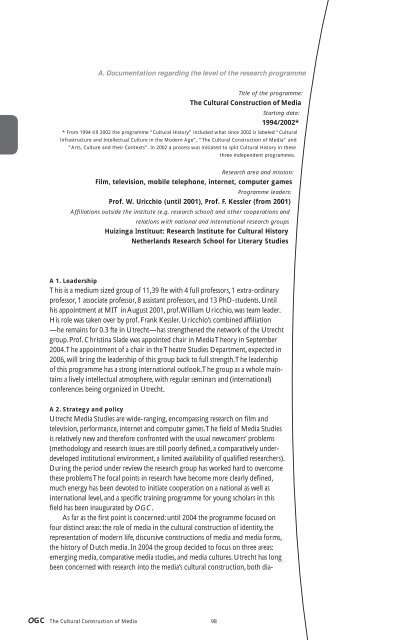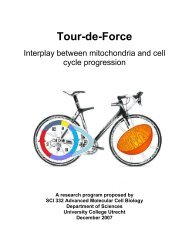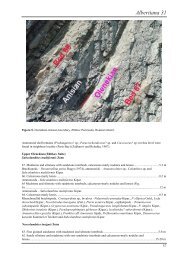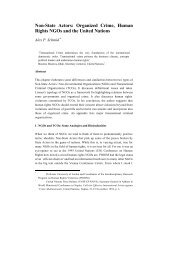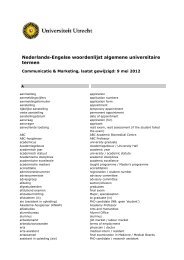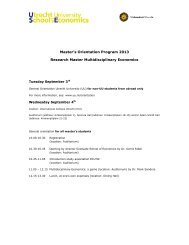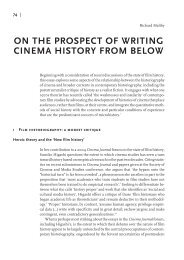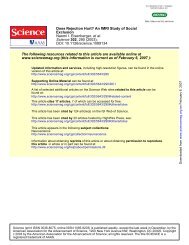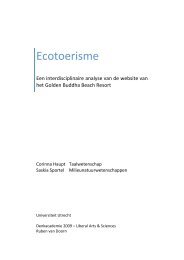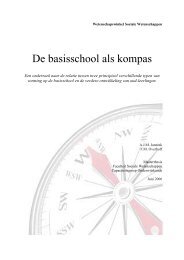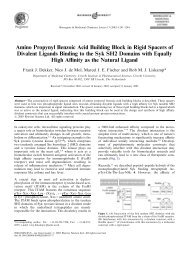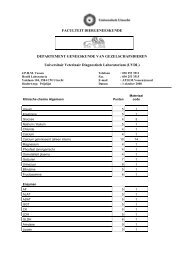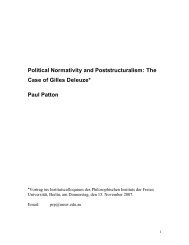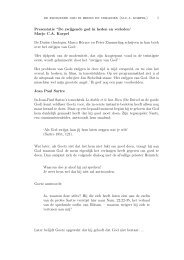Review of the Research Institute for History and - Universiteit Utrecht
Review of the Research Institute for History and - Universiteit Utrecht
Review of the Research Institute for History and - Universiteit Utrecht
Create successful ePaper yourself
Turn your PDF publications into a flip-book with our unique Google optimized e-Paper software.
A. Documentation regarding <strong>the</strong> level <strong>of</strong> <strong>the</strong> research programme<br />
Title <strong>of</strong> <strong>the</strong> programme:<br />
The Cultural Construction <strong>of</strong> Media<br />
Starting date:<br />
1994/2002*<br />
* From 1994 till 2002 <strong>the</strong> programme “Cultural <strong>History</strong>” included what since 2002 is labeled “Cultural<br />
Infrastructure <strong>and</strong> Intellectual Culture in <strong>the</strong> Modern Age”, “The Cultural Construction <strong>of</strong> Media” <strong>and</strong><br />
“Arts, Culture <strong>and</strong> <strong>the</strong>ir Contexts”. In 2002 a process was initiated to split Cultural <strong>History</strong> in <strong>the</strong>se<br />
three independent programmes.<br />
<strong>Research</strong> area <strong>and</strong> mission:<br />
Film, television, mobile telephone, internet, computer games<br />
Programme leaders:<br />
Pr<strong>of</strong>. W. Uricchio (until 2001), Pr<strong>of</strong>. F. Kessler (from 2001)<br />
Affi liations outside <strong>the</strong> institute (e.g. research school) <strong>and</strong> o<strong>the</strong>r cooperations <strong>and</strong><br />
relations with national <strong>and</strong> international research groups<br />
Huizinga Instituut: <strong>Research</strong> <strong>Institute</strong> <strong>for</strong> Cultural <strong>History</strong><br />
Ne<strong>the</strong>rl<strong>and</strong>s <strong>Research</strong> School <strong>for</strong> Literary Studies<br />
A 1. Leadership<br />
This is a medium sized group <strong>of</strong> 11,39 fte with 4 full pr<strong>of</strong>essors, 1 extra-ordinary<br />
pr<strong>of</strong>essor, 1 associate pr<strong>of</strong>essor, 8 assistant pr<strong>of</strong>essors, <strong>and</strong> 13 PhD-students. Until<br />
his appointment at MIT in August 2001, pr<strong>of</strong>. William Uricchio, was team leader.<br />
His role was taken over by pr<strong>of</strong>. Frank Kessler. Uricchio’s combined affi liation<br />
—he remains <strong>for</strong> 0.3 fte in <strong>Utrecht</strong>—has streng<strong>the</strong>ned <strong>the</strong> network <strong>of</strong> <strong>the</strong> <strong>Utrecht</strong><br />
group. Pr<strong>of</strong>. Christina Slade was appointed chair in Media Theory in September<br />
2004. The appointment <strong>of</strong> a chair in <strong>the</strong> Theatre Studies Department, expected in<br />
2006, will bring <strong>the</strong> leadership <strong>of</strong> this group back to full strength. The leadership<br />
<strong>of</strong> this programme has a strong international outlook. The group as a whole maintains<br />
a lively intellectual atmosphere, with regular seminars <strong>and</strong> (international)<br />
conferences being organized in <strong>Utrecht</strong>.<br />
A 2. Strategy <strong>and</strong> policy<br />
<strong>Utrecht</strong> Media Studies are wide-ranging, encompassing research on fi lm <strong>and</strong><br />
television, per<strong>for</strong>mance, internet <strong>and</strong> computer games. The fi eld <strong>of</strong> Media Studies<br />
is relatively new <strong>and</strong> <strong>the</strong>re<strong>for</strong>e confronted with <strong>the</strong> usual newcomers’ problems<br />
(methodology <strong>and</strong> research issues are still poorly defi ned, a comparatively underdeveloped<br />
institutional environment, a limited availability <strong>of</strong> qualifi ed researchers).<br />
During <strong>the</strong> period under review <strong>the</strong> research group has worked hard to overcome<br />
<strong>the</strong>se problems The focal points in research have become more clearly defi ned,<br />
much energy has been devoted to initiate cooperation on a national as well as<br />
international level, <strong>and</strong> a specifi c training programme <strong>for</strong> young scholars in this<br />
fi eld has been inaugurated by OGC.<br />
As far as <strong>the</strong> fi rst point is concerned: until 2004 <strong>the</strong> programme focused on<br />
four distinct areas: <strong>the</strong> role <strong>of</strong> media in <strong>the</strong> cultural construction <strong>of</strong> identity, <strong>the</strong><br />
representation <strong>of</strong> modern life, discursive constructions <strong>of</strong> media <strong>and</strong> media <strong>for</strong>ms,<br />
<strong>the</strong> history <strong>of</strong> Dutch media. In 2004 <strong>the</strong> group decided to focus on three areas:<br />
emerging media, comparative media studies, <strong>and</strong> media cultures. <strong>Utrecht</strong> has long<br />
been concerned with research into <strong>the</strong> media’s cultural construction, both dia-<br />
OGC The Cultural Construction <strong>of</strong> Media<br />
98


